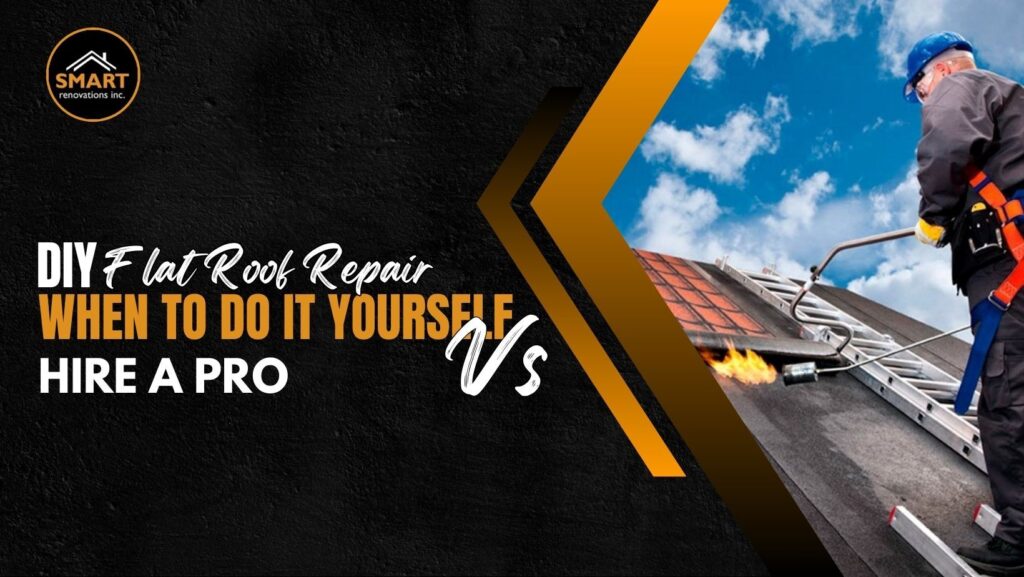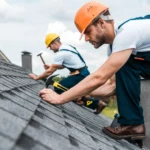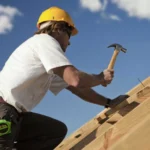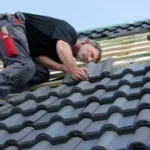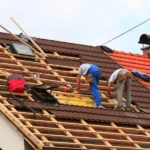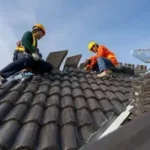Flat roofs are a popular choice for many homeowners due to their modern aesthetic and efficient use of space. However, they also require regular maintenance and repairs. Knowing when to tackle these repairs yourself and when to call in a professional like Smart Renovation Inc can save you time, money, and stress. In this comprehensive guide, we’ll explore the ins and outs of flat roof repair near me, helping you make informed decisions.
Understanding Your Flat Roof
Types of Flat Roofs
Before diving into repairs, it’s essential to understand the different types of flat roofs:
- Built-Up Roofing (BUR): Made of multiple layers of asphalt and felt, BUR is durable but can be complicated to repair.
- Single-Ply Membrane: This includes TPO, PVC, and EPDM roofs, which are easier to install and repair due to their single-layer design.
- Modified Bitumen: This type combines the best of both BUR and single-ply roofs, featuring asphalt and polymer to enhance durability.
Common Flat Roof Problems
Flat roofs face unique challenges, including:
- Ponding Water: Water accumulation can lead to leaks and structural damage.
- Cracks and Blisters: These can develop due to temperature fluctuations and wear over time.
- Membrane Damage: Tears or punctures in the membrane can expose the underlying structure to moisture.
Making A Waterproof Roof Out Of Solar Panels
10 Best Roofing Companies in the USA for Commercial Projects
DIY Flat Roof Repair: When to Do It Yourself
Assessing Your Skills
Before considering a DIY approach, evaluate your skills and comfort level with home repairs. If you have experience with roofing, basic tools, and safety equipment, you might be able to handle minor repairs.
Types of Repairs Suitable for DIY
- Minor Leaks: Small leaks can often be fixed with roofing cement or sealant.
- Ponding Water Management: Installing drains or correcting the slope can be a DIY project if you’re comfortable with basic plumbing.
- Crack Sealing: Small cracks can be sealed with roofing tape or patches.
Tools and Materials Needed
For a successful DIY repair, gather the following tools and materials:
- Roofing cement or sealant
- Roofing tape or patches
- A utility knife
- Safety gear (gloves, goggles, and a harness)
- A ladder
Safety Precautions
Safety should always be your top priority. Ensure you’re using the proper safety gear, working on a stable surface, and not attempting repairs during inclement weather.
When to Hire a Professional
Signs You Need a Pro
While some repairs are manageable on your own, others are best left to experts. Here are signs that indicate it’s time to call in Smart Renovation Inc:
- Widespread Damage: If multiple areas of your flat roof are affected, a professional assessment is necessary.
- Structural Issues: Sagging or visible signs of damage to the underlying structure require expert intervention.
- Complex Repairs: Repairs involving extensive membrane replacement or structural modifications should be handled by professionals.
Benefits of Hiring a Professional
- Expertise: Professionals have the training and experience to identify and fix issues effectively.
- Warranty: Many roofing companies offer warranties on their work, giving you peace of mind.
- Time-Saving: Hiring a pro can save you hours of work and potential frustration.
Brighter roof colors for boosting energy and appeal
Cost Comparison: DIY vs. Professional Repair
DIY Costs
- Materials: Depending on the repair, materials can range from $50 to $200.
- Time Investment: Consider the value of your time. DIY repairs may take longer than anticipated.
Professional Costs
- Labor: Hiring a professional can range from $300 to $1,500, depending on the extent of the work needed.
- Long-Term Savings: Although more expensive upfront, hiring a pro can prevent further damage and costly repairs down the line.
Maintenance Tips for Flat Roofs
Regular Inspections
Conduct regular inspections of your flat roof, looking for signs of wear, damage, or debris accumulation. Early detection can save you from more extensive repairs later.
Cleaning Your Roof
Regularly remove debris, leaves, and dirt from your roof to prevent water accumulation and damage. Use a broom or leaf blower, and avoid using sharp tools that could damage the membrane.
Professional Maintenance
Consider scheduling annual maintenance with a roofing professional. They can identify potential issues and recommend repairs before they become significant problems.
Conclusion
In summary, understanding when to tackle flat roof repairs yourself and when to hire a professional is crucial for maintaining the integrity of your home. While minor repairs may be manageable for a DIY enthusiast, complex issues should be left to experts like Smart Renovation Inc. Regular maintenance and inspections can also prolong the life of your flat roof, ensuring it remains leak-free and structurally sound.
By weighing your options carefully, you can make informed decisions that not only save you money but also protect your home for years to come. Whether you choose to DIY or hire a professional, taking action promptly will lead to a safer and more secure living environment.
Check our google store: Smart Renovation Inc

